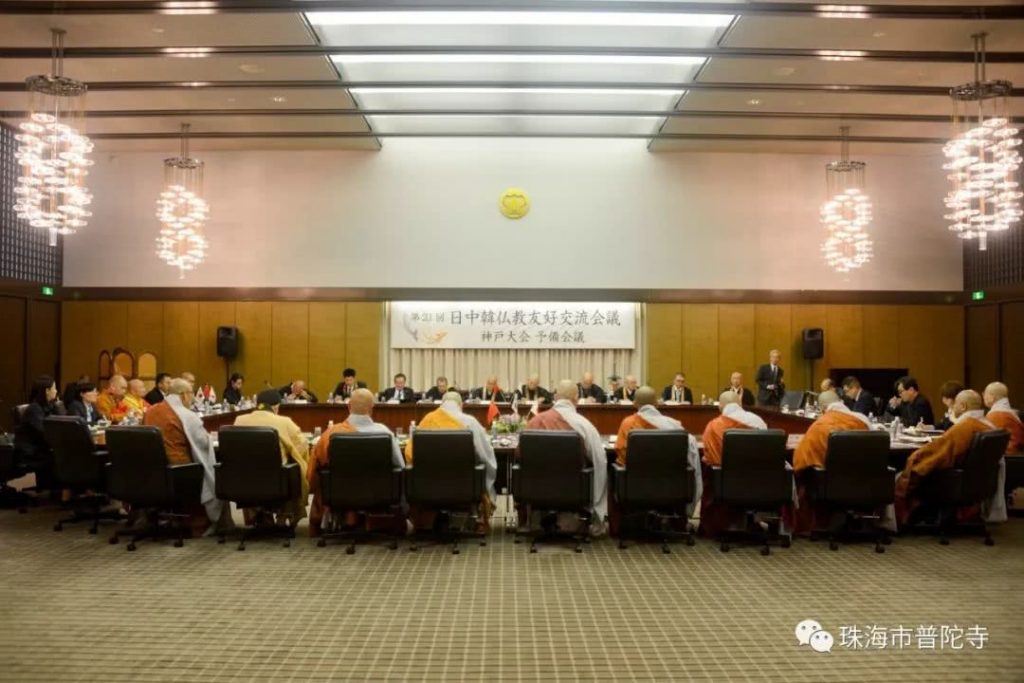It’s the rawest of sensitive matters, the heaviest of historical burdens. I am referring to the shadow of past pain, bloodshed, and war crimes inflicted by Japan against China during the Pacific War that raged from 1937 until 1945. Yet behind the scenes of turbulent political relations and unhealed wounds, influential Buddhist forces in China and Japan are moving quietly and steadily to bridge their respective spiritual worlds, with potentially beneficial knock-on effects for Sino-Japanese diplomacy.
Last month we reported that, for the first time, a cross-strait delegation led by the Buddhist Association of China (BCA) and the United Association of Humanistic Buddhism visited prominent Japanese Buddhist leaders at several major temples. Then on 25 April, the Sino-Japanese-Korean Buddhist Friendship and Dialogue Association (中日韩佛教友好交流预备会) held its 21st congress, in Kobe, Japan (Chinese only). The event was led by Grandmaster Ming Sheng of the Buddhist Association of China, Enryaku-ji abbot Ven. Takekakucho, and Ven. Zhi Yi of the Korea Buddhist Federation. At the forum, delegates discussed the tripartite relationship between China, Japan, and the Koreas in the 21st century, and what Buddhists in the respective nations could do to assist in fostering ecumenical and diplomatic understanding and cooperation.
Founded by the influential Buddhist householder and leader Zhao Puchu (1907-2000) in 1974, this organization was once called the Japan-China Friendship Buddhist Association and changed to its current name and institutional configuration in 1993. It is hard to underestimate how significant Mr. Zhao’s reaching out to Japan was, and how magnanimous his spirit was given the geopolitical context of the time. We must remember that he was born in 1907, in the twilight years of the Qing Dynasty and grew up during the Republican period, an era when European and American imperialism, though still prominent in China, had long ceded primacy to the colonialism of the Japanese Empire. Mr. Zhao lived through not only the Second Sino-Japanese War and World War II, but also the bloody Chinese Civil War that finally established CCP rule in the country. He witnessed the Great Leap Forward, the Cultural Revolution, and Deng’s economic reforms, which transformed China and thus the world.
It was not easy for Mr. Zhao to navigate through all these momentous events, and he was human like any other. Yet through all this time he came to see how modern China learned to interact with the world and get to grips with international diplomacy. He achieved something undeniably monumental: through his good relationships with Japanese Buddhists, he was able to ask them to lobby the Japanese government to recognize the People’s Republic of China in 1972, a full seven years before the United States did. While there were of course many other factors for Japan’s recognition of the PRC, we see in Mr. Zhao the beginnings of the “Buddhist diplomat” that, while not some official government position (nor should it be), can help effect positive domestic and international change through Buddhism.
This informal role is not only being consolidated in China (through the BCA’s liaison with the United Front Work Department), but also in other countries that share relationships with Buddhist elites. Indeed, the way that Buddhist clerics and intellectuals functioned throughout 2,000 years of imperial Chinese history has been to operate at various levels of influence and leverage, implementing change in a rather Buddhist way that is both “within” and “outside of” the governing apparatus.
During the cross-strait ecumenical visit, Ven. Zhan Ru of the Buddhist Association of China gifted Ryuzen Fukuhara (Hyakumanben Chion-ji’s leader and vice president of the Japan-China Friendship Pure Land Association) with a calligraphic scroll reading “bu wang chuxin” (不忘初心). Roughly (it can be translated in multiple ways), it could mean “Not forgetting the original heart or intent.” This saying, presented by a Chinese monk to a Japanese counterpart, is pregnant with meaning. While Japanese Buddhism is unique and rightly sees itself as a rich and independent force, it cannot and should never try to sever its connection to China.
It is from China that Buddhism arrived in Japan, and they will always be neighbours: physically separated only by a stretch of the ocean, deeply economically integrated, influencing each other’s cultures and societies, and desperately in need for reconciliation after the fractures of the 19th and 20th centuries. “Bu wang chuxin” is a timely reminder to remember that the Buddha was long before China and Japan emerged as nation-states. The Dharma is reality itself whilst China and Japan can always change and align themselves closer to the cosmic energy that suffuses, yet is beyond all, conditioned things.


